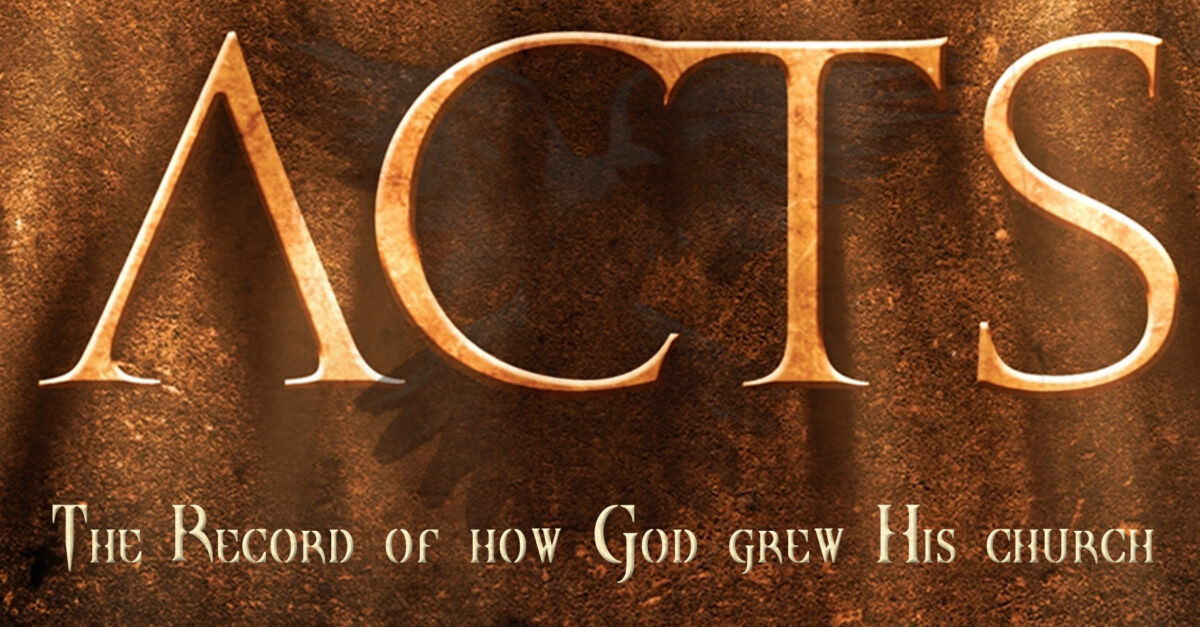Acts 1:1-3
1 In my former book, Theophilus, I wrote about all that Jesus began to do and to teach 2 until the day he was taken up to heaven, after giving instructions through the Holy Spirit to the apostles he had chosen. 3 After his suffering, he presented himself to them and gave many convincing proofs that he was alive. He appeared to them over a period of forty days and spoke about the kingdom of God.
Verse 1 Luke referred to his Gospel here as ‘my former book’. Acts is the second book in the history that Luke wrote. He wrote both books for Theophilus. This Greek name means ‘someone who loves God’. Perhaps Luke was using it to mean any Christian reader. But it is more likely that Theophilus was a real person. In Luke 1:3, Luke called him ‘most excellent’. Therefore, Theophilus might have been an important man that worked for the government.
Verse 2 Luke wrote that his Gospel was about everything that Jesus began to do. And it was about everything that Jesus began to teach. After he had returned to his Father, Jesus continued to do things. And he continued to teach. Luke’s second book describes these things. Jesus continued his work by his Holy Spirit, by means of his apostles. The Greek word ‘apostolos’ means a person with a message. That person (an apostle) had special authority from the person who had sent him. Therefore an apostle could act for the person who sent him. So, the apostles too would be leaders of Christians, as Jesus was their leader. Jesus chose his 12 disciples to be his apostles.
Verse 3 The disciples were sure that Jesus had overcome death. He had proved to them many times that he was still alive. His resurrection had really happened. It was true. This was the most important part in their message.
Jesus continued to teach them about his favorite subject. This was God’s kingdom. God’s kingdom had come by means of Jesus’ life, death and resurrection.
Acts 1:4-8
4 On one occasion, while he was eating with them, he gave them this command: “Do not leave Jerusalem, but wait for the gift my Father promised, which you have heard me speak about. 5 For John baptized with water, but in a few days you will be baptized with the Holy Spirit.”
6 Then they gathered around him and asked him, “Lord, are you at this time going to restore the kingdom to Israel?”
7 He said to them: “It is not for you to know the times or dates the Father has set by his own authority. 8 But you will receive power when the Holy Spirit comes on you; and you will be my witnesses in Jerusalem, and in all Judea and Samaria, and to the ends of the earth.”
Verse 4 Jesus was eating with his disciples after his resurrection. He also did this on other occasions after the*resurrection (Luke 24:30-31, 42-43). This was not because he needed food. It was to prove that he was real.
In his Gospel, Luke recorded the Father’s (God’s) promise. The Father had promised that power from above would come to the disciples (Luke 24:49).
Verse 5 In this verse, Luke reminds us about John the Baptist’s words. John said this about Jesus: ‘He will baptise you with the Holy Spirit and he will baptise you with fire’ (Luke 3:16).
Verse 6 The Jews were proud that God had chosen them as his people. They wanted other nations to know that they (the Jews) were important. The Jews seemed weak and the Romans ruled over them. The Jews wanted God to prove that they were superior. They wanted him to give them power over all the other nations. So, the disciples asked Jesus, ‘Lord, are you at this time going to restore the kingdom to Israel?’
Verse 7 Jesus did not answer ‘yes’ or ‘no’ to the disciples’ question. Instead, he said that this information belonged to the Father only. He did not want them to think about political power. He wanted them to preach the gospel. He wanted them to concentrate on that.
Verse 8 The power that they would receive was not power over other people. Instead, it was power from heaven. This power would make them able to continue Christ’s work on earth.
‘You will be my witnesses in Jerusalem. You will also be my witnesses in all Judea and Samaria, and all over the earth.’ A witness has seen something with his own eyes. Therefore, he knows that it is true. The Greek word for ‘witness’ is ‘martus’. It also means ‘*martyr’ (a person who is willing to die for his or her beliefs). A witness must be willing to die for Christ if this is necessary. In verse 8, Luke tells us what the whole book is about. In the first 7 chapters, he describes how the good news spread in Jerusalem. In Acts 8:11-11:18, he describes what happened in Judea and Samaria. In the last part, he describes how the gospel spread through the Gentile world.
Of course, the story did not end there. Today, Christians must continue to tell people in every nation about Jesus. God wants everyone in the world to hear the good news.
Luke is writing Acts as a continuation of his Gospel that recorded the life of Christ. Acts is to be a record of the acts of the apostles after Christ’s death and resurrection.
